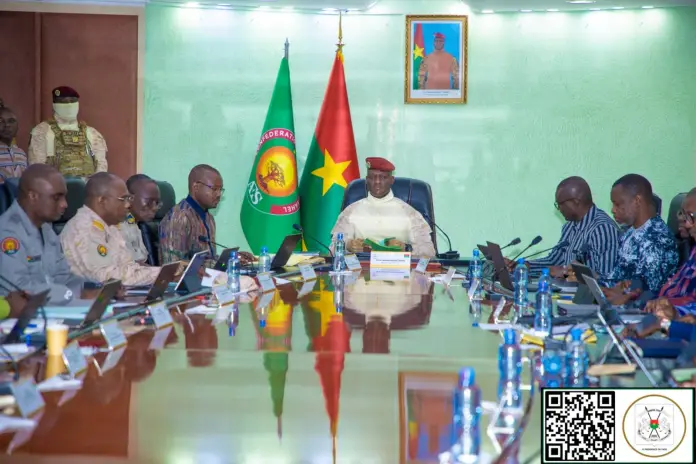
Burkina Faso’s weekly Council of Ministers session, chaired by President Captain Ibrahim Traoré, resulted in several key decisions on Wednesday aimed at strengthening the country’s public administration, social justice, and media governance.
Government Spokesperson Pingdwendé Gilbert Ouédraogo reported that the cabinet approved a major financial measure to regularize civil servant career advancements under the State Public Service Statute.
Public Service Minister Mathias Traoré explained that public servants are classified into three categories: 1st, 2nd, and 3rd class.
Advancement requires a minimum score of 8 out of 10 and completion of years of service—ten years for promotion from 1st to 2nd class, and eight years from 2nd to 3rd class.
“More than 36,700 officers are eligible to move from 2nd to 3rd class, and around 36,000 from 1st to 2nd class, at a total cost of approximately 9.7 billion CFA francs,” said Minister Traoré.
He noted that the move reflects the government’s recognition of civil servants’ contributions to the fight against terrorism and national resilience.
In the area of media and communication, the Council examined three critical reports from the Ministry of Communication, Culture, Arts, and Tourism. A new draft law was introduced to unify all existing legislation governing print, digital, radio, and television media under a single code.
Minister Ouédraogo emphasized that the new code would help regulate media activities more effectively by defining the roles and responsibilities of professional journalists and technicians, organizing funding frameworks for media organizations, and integrating existing digital terrestrial television regulations.
A second decision approved the updated organizational statutes for the national broadcaster Radiodiffusion Télévision du Burkina (RTB). The reform aims to modernize RTB’s structure to better meet current and future media challenges.
The third reform involves a decree establishing a system for labeling cultural assets and accrediting civil society organizations.
This measure follows the 2023 law for the protection and promotion of cultural heritage in Burkina Faso, aiming to safeguard and enhance the nation’s diverse cultural expressions.
The session underscores the government’s commitment to civil service reform, improved media governance, and cultural preservation as key pillars of national development.



